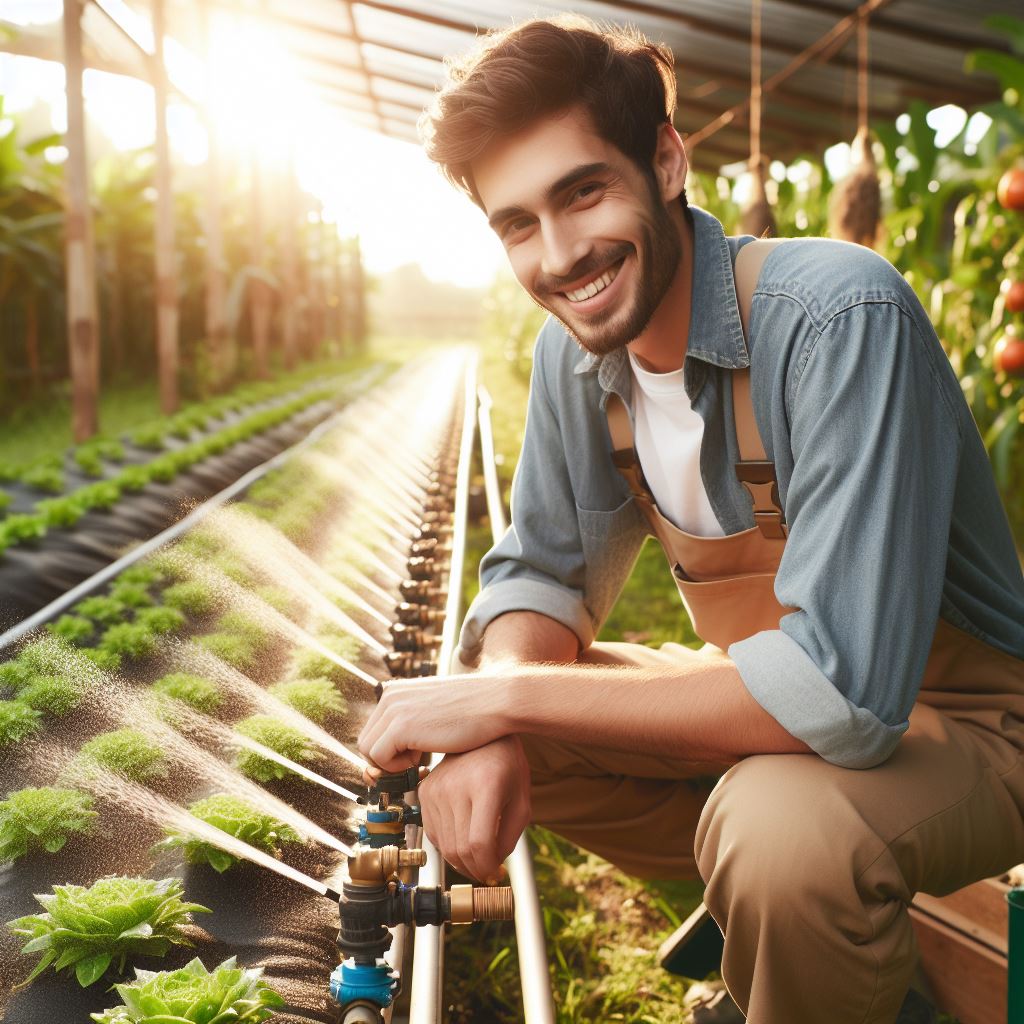Introduction
Water conservation is of utmost importance in agriculture as it ensures the sustainable use of this precious resource. With the help of agricultural technology, we can effectively conserve water and increase crop yield.
Water is essential for agriculture as it plays a vital role in crop growth and development.
By implementing agriculture technology, such as smart irrigation systems, farmers can optimize water usage and reduce wastage.
The use of precision farming techniques allows farmers to monitor soil moisture levels in real-time, enabling them to apply water only when necessary.
Furthermore, advanced drip irrigation systems can deliver water directly to the roots of plants, minimizing evaporation and maximizing efficiency.
Agriculture technology also enables farmers to collect and store rainwater, reducing their reliance on freshwater sources.
Furthermore, the use of sensors helps farmers track water levels in rivers, lakes, and reservoirs, ensuring responsible water usage.
In addition to conserving water, agri-tech also contributes to increased crop yield.
Precision agriculture techniques allow farmers to accurately monitor crop health, detect diseases, and apply targeted treatments, resulting in healthier, more productive plants.
By optimizing water usage, farmers can ensure that their crops receive the right amount of moisture at the right time, leading to improved yields.
The role of agricultural technology in water conservation cannot be underestimated.
By implementing these technologies, we can ensure the sustainable use of water in agriculture while also increasing crop productivity.
Farmers and policymakers must embrace and promote these advancements for a more efficient and sustainable agricultural future.
Current challenges in agriculture water usage
Water scarcity and limited access to water resources
Access to clean and sufficient water resources is crucial for agricultural activities. However, water scarcity and limited access to such resources pose significant challenges.
Many regions around the world are currently facing water scarcity due to various factors such as climate change, population growth, and inefficient water management.
Transform Your Agribusiness
Unlock your farm's potential with expert advice tailored to your needs. Get actionable steps that drive real results.
Get StartedInefficient irrigation practices leading to wastage
One of the major challenges in agriculture water usage is the inefficient irrigation practices that result in waste of water.
Traditional irrigation methods such as flood irrigation, which involves manually flooding the fields, often lead to excessive water usage.
This not only wastes water but also results in reduced crop yields and unnecessary expenses for farmers.
Environmental impact of excessive water use
- The excessive use of water in agriculture hurts the environment.
- When water is not managed efficiently, it can lead to the depletion of water bodies such as rivers, lakes, and underground water sources.
- This not only affects the availability of water for other uses but also disrupts the ecosystem and biodiversity in the surrounding areas.
Additionally, excessive water use in agriculture contributes to water pollution.
The runoff from irrigated fields can carry pesticides, fertilizers, and other chemicals into rivers and lakes, polluting the water and harming aquatic life.
This contamination of water sources also poses a risk to human health when consumed or used for domestic purposes.
Read: Idaho Potato Grower’s Eco-friendly Tale
The role of agri-tech in water conservation
In recent years, the agricultural sector has been facing numerous challenges due to increasing water scarcity and the need to feed a growing population.
The advancement of agri-tech has played a vital role in addressing these challenges by introducing innovative solutions to conserve water. Let’s explore some of the key technologies:
Introduction of precision irrigation systems
Precision irrigation systems have revolutionized water management in agriculture. These systems use advanced technologies to deliver the right amount of water to crops, based on their specific needs.
By precisely targeting the irrigation process, farmers can minimize water wastage and ensure optimal water usage, leading to significant water savings.
Sensor-based irrigation techniques
Sensor-based irrigation techniques utilize various types of sensors to monitor soil moisture levels, weather conditions, and plant water requirements.
These sensors provide real-time data to farmers, enabling them to make informed decisions about when and how much water to apply to their crops.
By using sensors, farmers can avoid overwatering or underwatering, resulting in water conservation without compromising the health and productivity of plants.
Smart irrigation controllers
Smart irrigation controllers are intelligent devices that automate the irrigation process based on factors such as soil moisture, weather forecasts, and plant water needs.
These controllers optimize irrigation schedules, and adjust watering frequency, and duration, all of which contribute to water savings.
By leveraging data analytics and smart algorithms, smart irrigation controllers ensure efficient water usage, reducing water wastage and promoting sustainable agriculture.
Drip irrigation system
The drip irrigation system is a widely adopted technology for water conservation in agriculture. It involves delivering water directly to the plant roots through a network of pipes and emitters.
By minimizing water evaporation and runoff, drip irrigation reduces water loss and ensures that plants receive water where they need it the most.
This system not only saves water but also enhances crop yield and quality, making it a preferred choice for farmers worldwide.
Soil moisture monitoring technologies
- Soil moisture monitoring technologies enable farmers to precisely assess the moisture content in the soil.
- By understanding the soil’s moisture status, farmers can determine the optimal irrigation timing and quantity based on the actual needs of crops.
- These technologies prevent over-irrigation and provide valuable insights into the water requirements, thus conserving water resources effectively.
In short, agri-tech has emerged as a game-changer in water conservation efforts in agriculture.
It offers a plethora of innovative tools and techniques that optimize water usage, reduce wastage, and promote sustainable farming practices.
Precision irrigation, sensor-based techniques, smart controllers, drip irrigation, and soil moisture monitoring are agri-tech pillars addressing water scarcity in farming.
With the adoption of these technologies, farmers can conserve water while maximizing crop productivity, ensuring food security for the present and future generations.
Showcase Your Farming Business
Publish your professional farming services profile on our blog for a one-time fee of $200 and reach a dedicated audience of farmers and agribusiness owners.
Publish Your ProfileRead: Growing Green: A Young Farmer’s Organic Quest
Benefits of agri-tech in water conservation and increased yield
Agri-tech, with its innovative solutions, has proven to be a game-changer in the agriculture industry
By leveraging advanced technologies, farmers are now able to conserve water and increase their crop yields, leading to improved profitability and a sustainable future.
Let’s explore the benefits of agri-tech in water conservation and increased agricultural yield in more detail.
Reduced water wastage and increased efficiency in irrigation practices
One of the key advantages of agri-tech in water conservation is the reduced wastage of water and increased efficiency in irrigation practices.
Traditional farming methods often result in excessive water use, either due to improper timing or inefficient distribution.
With the implementation of smart irrigation systems and sensor-based technologies, farmers can now accurately monitor soil moisture levels and only water their crops when necessary.
This not only conserves water but also prevents over-watering, which can lead to diseases and stunted crop growth.
Improved crop health and growth with optimal water supply
In addition to water conservation, agri-tech plays a crucial role in improving crop health and growth. With optimal water supply, crops receive the exact amount of moisture required for their development.
Advanced monitoring devices enable farmers to track water requirements, ensuring that crops do not face water stress or excess saturation.
As a result, plants grow healthier, are more resistant to pests and diseases, and have higher chances of achieving their full yield potential.
Enhanced crop yield and profitability for farmers
The use of agri-tech also leads to enhanced crop yield and profitability for farmers.
By employing precision agriculture techniques, such as automated systems and data analytics, growers can identify areas where crops may be experiencing stress or nutrient deficiencies.
This enables them to take timely corrective actions, such as adjusting irrigation schedules or applying targeted fertilizers.
As a result, crop yield improves significantly, reducing production costs and maximizing profits for the farmers.
Environmental sustainability and conservation of water resources
- Furthermore, agri-tech contributes to environmental sustainability by conserving water resources.
- As the world grapples with water scarcity and climate change, efficient agricultural water use becomes paramount.
- Agri-tech solutions allow for precise water management, ensuring that every drop of water is utilized optimally.
- This not only reduces the strain on local water sources but also minimizes the energy required for pumping and treating water, leading to a greener and more sustainable agriculture sector.
In essence, the benefits of agri-tech in water conservation and increased yield are numerous.
From reducing water wastage to improving crop health and profitability, and promoting environmental sustainability, agri-tech has revolutionized the way farmers approach agriculture.
By embracing these technological advancements, we can secure a prosperous future for both farmers and the planet.
Read: Sustainable Rice Farming in Louisiana

Find Out More: Farming Futures: Young Voices in Agriculture
Success stories and examples of agri-tech solutions
Agri-tech solutions have proven to be highly effective in saving water and increasing crop yields. Let’s take a look at some success stories and examples of agri-tech implementations:
Case study 1: Implementation of precision irrigation system in a farm
One farmer in Nebraska, John, implemented a precision irrigation system on his farm. This system utilizes sensors to monitor soil moisture levels accurately.
The sensors send real-time data to a computerized controller, which adjusts the amount of water supplied to the crops based on their needs.
As a result, John has reduced water wastage and focused irrigation only on areas that require it the most.
This precision irrigation system has helped John optimize water usage, resulting in significant cost savings while increasing the overall crop yield.
Case study 2: Use of sensor-based irrigation technology in a vineyard
A vineyard owner in California, Sarah, integrated sensor-based irrigation technology into her grape farms.
These sensors are strategically placed in the vineyard to measure crucial variables like soil moisture, temperature, and humidity.
Based on the collected data, the irrigation system automatically adjusts the water supply to ensure optimal growing conditions for the grapevines.
Sarah has observed significant improvements in vine health, reduced water consumption, and an increase in grape yield and quality since implementing this technology.
Case study 3: Adoption of drip irrigation system in a vegetable farm
- A vegetable farmer in India, Rajesh, adopted a drip irrigation system to address the water scarcity in his region.
- This system delivers water directly to the roots of the plants in a slow and precise manner using a network of tubes and emitters.
- Rajesh has seen a substantial reduction in water usage compared to traditional flood irrigation methods.
- The drip irrigation system helped him distribute water evenly, prevent water runoff, and minimize weed growth.
- With this technology, Rajesh has witnessed improved crop productivity and water efficiency, contributing to a more sustainable agricultural practice.
These success stories highlight the positive impact of agri-tech solutions on water conservation and crop growth.
Implementing precision irrigation systems, sensor-based irrigation technology, and drip irrigation systems have all resulted in significant improvements in resource management and crop productivity.
Farmers worldwide must embrace these agri-tech solutions to address the challenges of water scarcity, increasing demands for food production, and sustainable agriculture.
By adopting such technologies, farmers can achieve water savings, optimize crop growth, reduce environmental impacts, and ensure food security for the growing global population.
Overall, agri-tech is playing a key role in revolutionizing agriculture and paving the way for a more efficient and sustainable farming future.
Challenges and Considerations in Adopting Agri-Tech for Water Conservation
When it comes to adopting agri-tech for water conservation in agriculture, some several challenges and considerations need to be addressed.
These challenges can hamper the widespread implementation and utilization of agri-tech systems, hindering the potential benefits they can bring.
Let’s explore some of these challenges below:
Cost Implications and affordability for small-scale Farmers
One of the main challenges in adopting agri-tech for water conservation is the cost implications associated with these technologies.
Many agri-tech systems require substantial investments in terms of equipment, installation, and maintenance.
This can pose a significant financial burden, especially for small-scale farmers who may not have the necessary resources to afford such investments.
Showcase Your Farming Business
Publish your professional farming services profile on our blog for a one-time fee of $200 and reach a dedicated audience of farmers and agribusiness owners.
Publish Your ProfileThus, finding affordable and cost-effective solutions is crucial in making agri-tech accessible to all farmers.
Training and education for farmers to understand and use technology effectively
Another challenge is providing adequate training and education for farmers to understand and effectively use agri-tech systems.
While these technologies have the potential to improve water efficiency, they often require a certain level of technical knowledge and expertise to operate.
Therefore, it is essential to provide training programs and educational resources to empower farmers with the necessary skills to utilize agri-tech effectively.
This will facilitate the adoption and successful implementation of these technologies in agricultural practices.
Maintenance and technical support for agri-tech systems
- Maintaining and providing technical support for agri-tech systems is another critical consideration.
- Like any other technology, agri-tech systems require regular maintenance and potentially troubleshooting technical issues that may arise.
- Farmers need to have access to reliable and prompt technical support to address any problems they encounter.
- Furthermore, farmers need prior awareness of maintenance costs for sustainable management of agri-tech systems in the long run.
Although agri-tech holds immense potential for water conservation in agriculture, several challenges and considerations need to be addressed for its successful adoption.
To harness agri-tech benefits in water conservation, address cost, offer training, ensure compatibility, manage data privacy, and overcome infrastructure limitations.
By addressing these challenges, we can create an environment where agri-tech becomes a valuable tool for sustainable agricultural practices.
Read: New York Apple Orchard’s Green Shift
Learn More: Innovative Farming on 10 Acres: A Journey
Conclusion
The importance of agri-tech in water conservation and increased yield cannot be overstated.
Through the use of innovative technologies, farmers can maximize their productivity while minimizing water usage.
Farmers need to explore and adopt agri-tech solutions to address the challenges of water scarcity.
These technologies offer numerous benefits, including improved irrigation methods, precision farming, and data-driven decision-making.
By implementing agri-tech solutions, farmers can optimize their water usage, conserve resources, and minimize environmental impact.
These advancements not only benefit individual farmers but also contribute to the overall sustainability of the agriculture industry.
Looking into the future, there is immense potential for agri-tech advancements in water conservation.
The development of smart sensors, remote monitoring systems, and automated irrigation techniques will further revolutionize farming practices.
As the global population continues to grow, the demand for food and water resources will increase. Agri-tech will play a crucial role in meeting these demands sustainably and efficiently.
Farmers need to embrace these technologies and stay updated with the latest advancements.
In closing, agri-tech offers a promising solution to the challenges faced by farmers in water conservation and increased yield.
By adopting these technologies, farmers can not only thrive in a changing environment but also contribute to a more sustainable future.




